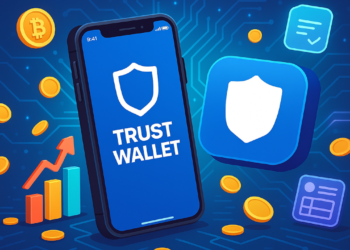In the world of cryptocurrency, airdrops have become a popular way for blockchain projects to distribute tokens to users. If you’ve been in the crypto space for a while, chances are you’ve heard of or even received an airdrop. But what exactly are airdrops? Why do they happen, especially during project migrations? And how can you benefit from them?
In this comprehensive guide, we’ll explore the concept of airdrops, how they work, their purpose in token migrations, and how you can safely participate while securing your assets. Whether you’re a seasoned investor or just starting out, this guide will give you valuable insights into one of the most fascinating phenomena in the crypto ecosystem.
What Is a Crypto Airdrop?
A crypto airdrop is a marketing or distribution strategy where a blockchain project sends free tokens or coins to a specific group of users, typically wallet holders. This is done to promote the project, increase community engagement, or reward loyal users.
There are several types of airdrops, including:
- Standard airdrops – Free tokens sent to users for simply holding a wallet.
- Holder airdrops – Tokens distributed to holders of a specific coin (e.g., ETH or BTC).
- Bounty airdrops – Require users to complete tasks like sharing posts or joining Telegram groups.
- Exclusive airdrops – For early adopters or specific community members.
- Migration airdrops – Distributed when a project migrates to a new blockchain or changes its token standard.
Why Do Projects Perform Airdrops?
Airdrops serve several key purposes:
1. User Acquisition and Marketing
Projects use airdrops to generate buzz and attract users. Free tokens are an incentive for people to explore a new project, potentially increasing adoption and awareness.
2. Rewarding Loyal Users
Loyal users who supported a project from the early stages may receive tokens as a reward for their commitment.
3. Decentralization
Distributing tokens widely helps decentralize ownership and governance of a protocol, which is important for many Web3 projects.
4. Blockchain or Token Migration
One of the most common—and technical—reasons for an airdrop is a project migration. Let’s dive deeper into how that works.
Token Migrations and Why Airdrops Are Needed
Sometimes projects evolve and move to a different blockchain or upgrade their technology. This could involve:
- Migrating from Ethereum to a layer 2 like Arbitrum or Optimism.
- Switching from a token on Binance Smart Chain to Solana.
- Moving from a token (ERC-20) to a native coin on their own blockchain.
When this happens, the project needs a mechanism to give existing users the new version of the token. This is where airdrop migrations come into play.
Real-World Example: Airdrop After Migration
Imagine a DeFi project that initially launched on Ethereum with an ERC-20 token called $XYZ. Later, the project develops its own blockchain and wants users to start using native $XYZ coins on this new chain.
The developers can snapshot all current token holders and airdrop the new version of $XYZ to those users. This ensures a smooth transition and maintains the community’s value.
How Airdrop Migrations Work (Step by Step)
Here’s a general overview of the airdrop migration process:
- Announcement The project team announces the migration and airdrop. Users are typically given instructions and a timeline.
- Snapshot The project takes a snapshot of the blockchain at a specific block. This records which wallets hold the token and how much they own.
- New Token Creation The team mints new tokens on the new chain or system.
- Token Distribution The new tokens are airdropped to users’ wallets, often automatically or through a claim portal.
- Token Bridging (Optional) Some projects allow users to bridge old tokens to the new chain in a phased migration.
Common Risks and How to Stay Safe
While airdrops are exciting, they also come with risks:
1. Scams and Fake Airdrops
Never connect your wallet to untrusted websites claiming to offer free airdrops. Always verify announcements through official channels.
2. Phishing Attacks
Some malicious actors send fake airdrops that, when interacted with, can compromise your wallet.
3. Dusting Attacks
Receiving very small amounts of unknown tokens could be part of a privacy-invading strategy. Don’t interact with unknown tokens.
To protect your assets, it’s essential to use a hardware wallet like the Trezor Model T. It keeps your private keys offline, making it nearly impossible for attackers to drain your wallet—even if you accidentally connect to a malicious dApp.
How to Find Legitimate Airdrops
There are several ways to find legitimate airdrops:
- Follow trusted influencers and crypto news sites.
- Join project Discord and Telegram groups.
- Use reputable aggregators like airdrops.io or CoinMarketCap’s airdrop section.
- Be active in early-stage projects (NFTs, DeFi, L2 ecosystems).
Also, trading or holding tokens on exchanges that collaborate with airdrop projects may increase your chances of receiving them. Two reliable platforms are:
✅ Bitvavo – a beginner-friendly exchange based in Europe. Low fees and ideal for holding airdrop-eligible assets.
✅ MEXC – often supports airdrop campaigns and token migrations for altcoins and new listings.
Airdrops That Changed Lives
Here are a few notable airdrops that made early adopters a lot of money:
1. Uniswap (UNI)
In 2020, Uniswap airdropped 400 UNI tokens (~$1000 at the time) to all users who had used the protocol. The price later surged, and those tokens were worth over $10,000.
2. Arbitrum (ARB)
In 2023, Arbitrum launched a massive airdrop to early adopters and developers on their network, distributing ARB tokens worth thousands of dollars to individual users.
3. dYdX
This decentralized trading platform rewarded users with up to $50,000 worth of tokens based on their past activity.
Are Airdrops Taxable?
In many jurisdictions, airdrops are considered taxable income at the time you receive them. It’s important to consult your local tax advisor to understand the implications in your country.
Some countries tax airdrops upon receipt, while others may only tax them when you sell the tokens. Keep records of:
- Date received
- Token amount
- Market value at the time
Tips for Maximizing Airdrop Gains
- Be active in new ecosystems (especially Layer 2s and Cosmos/Polkadot zones).
- Use non-custodial wallets like MetaMask and Trust Wallet.
- Participate in testnets and governance proposals.
- Bridge assets early to emerging chains.
- Secure your assets with cold storage (e.g., Trezor Model T) to avoid airdrop theft.
Final Thoughts
Airdrops are more than just “free money.” They’re a strategic tool used by projects to grow their communities, reward early users, and facilitate seamless migrations to better technologies. If you know how to spot them, prepare, and keep your wallet secure, they can be a powerful way to earn passive income and get involved in promising new projects.
Start by creating an account on platforms like Bitvavo and MEXC to position yourself for future opportunities. And don’t forget: always store your valuable assets on a secure device like the Trezor Model T.
Disclaimer
This article is for informational purposes only and does not constitute financial, tax, or investment advice. Always do your own research before participating in any crypto-related activity. Cryptocurrency investments carry risks, including the loss of capital. Consult a licensed advisor for personal guidance. This post contains affiliate links; we may earn a commission at no extra cost to you.










